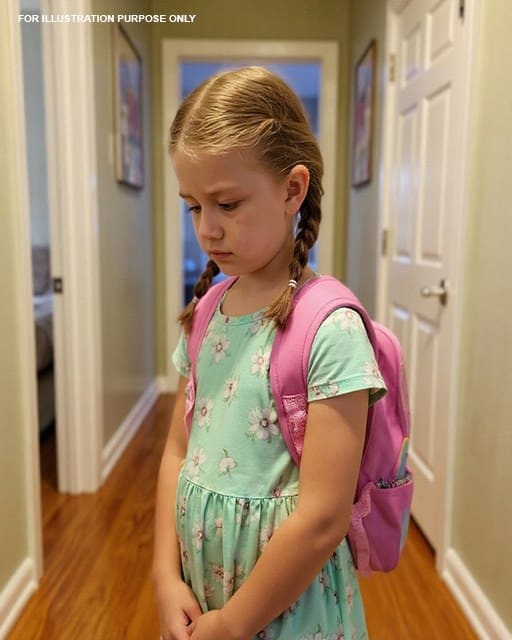When my ex and I split, I told myself I’d make co-parenting work for Julia’s sake. She was nine—old enough to clock the tension, too young to decode it. Every other Friday she’d skip down the steps with an overnight bag, blow me a kiss, and I’d spend forty-eight hours pacing a quiet house and pretending this was normal.
The first crack was small: Molly, her American Girl doll, didn’t come home.
“Where’s Molly?” I asked as Julia unpacked.
“Oh. I left her at Dad’s,” she said, distracted. “He couldn’t find her.”
Kids misplace things, I reminded myself.
Then the iPad vanished. The one she’d saved allowance for. “Dad’s keeping it safe,” she said, not meeting my eyes.
Safe from what?
I swallowed my unease until the day she wore my mother’s necklace to his house—a thin gold chain with a tiny heart. It’s the only thing of my mom’s she remembers. On Sunday, it wasn’t around her neck.
“Where’s Grandma’s necklace?” My voice came out tight.
“I wore it there,” she said, tears brimming. “Dad put it somewhere safe. Then he… couldn’t find it.”
I called my ex. He sighed. “She’s careless. You coddle her. It’ll turn up.”
Julia isn’t careless. Not with things that matter.
So I stopped asking and started watching. I tucked an AirTag into the lining of her favorite hoodie. It felt sneaky and wrong. I did it anyway.
That weekend, her little dot traveled to his house—and then drifted downtown. Not to a park. Not to a store they’d ever gone to together. To a pawn shop.
My heart pounded in my ears. Glitch, I told myself. Coincidence. But dread settled in like a stone.
The next time, I slipped a tiny recorder into her backpack. I told myself it was for her protection. I told myself a lot of things.
On Sunday night, I sat at the kitchen table and hit play. A hum of dishes, footsteps, then her small voice:
“Dad, can I have my doll back?”
“I told you, Julia, you don’t need it. Stop asking.”
“But it’s mine.”
“You don’t understand,” he snapped. “Things are tight. That doll isn’t worth anything sitting in your room.”
My hands shook. Later on the recording, she asked about the iPad. He said it was “better off” somewhere else. She whispered about the necklace. His voice dropped. “It was gathering dust. You’ll get over it.”
I didn’t storm over. I didn’t scream. I gathered proof. AirTag history. The audio. Then I went to the pawn shop myself. The owner didn’t blink when I said my ex’s name. “Yeah, he brought in a doll, an iPad, some jewelry. Sold quick. Shame about the necklace. It was nice.”
I left with receipts and shaking knees. Then I called my lawyer.
Family court moves like honey, but facts speak. He tried to spin it—Julia loses things, he was protecting her property, I’m dramatic—but the timeline, the audio, the paperwork lined up like dominos. The judge reduced his weekends to supervised visits and ordered restitution. Money doesn’t pull a heart pendant off a stranger’s throat, but truth, at least, had a voice.
Julia cried when I told her she wouldn’t be sleeping at his house anymore. She still loves him. She doesn’t understand how love and hurt can share the same face. I held her and said the thing she needed most: none of this is your fault.
It took time to unteach the lesson he’d been drilling into her—that her wants were disposable, her “no” was negotiable, her things weren’t really hers. For weeks, she asked if it was okay to wear a favorite sweater, bring a sketchbook to the park, take her new doll to a sleepover. Every time, I said yes. Every time, I handed her back a little piece of herself.
We saved for another iPad. She picked a new doll and named her Rosie. I bought her a simple gold chain. Sometimes I catch her in the mirror, touching the pendant and smiling like she can feel my mother’s palm on her shoulder.
People told me I was paranoid. Dramatic. Bitter. Maybe I was all three. But my gut knew before my head did. I followed it with an AirTag, a recorder, and a promise: when my daughter speaks—even in whispers I have to fight to hear—I will listen, and I will not let anyone take her voice.
